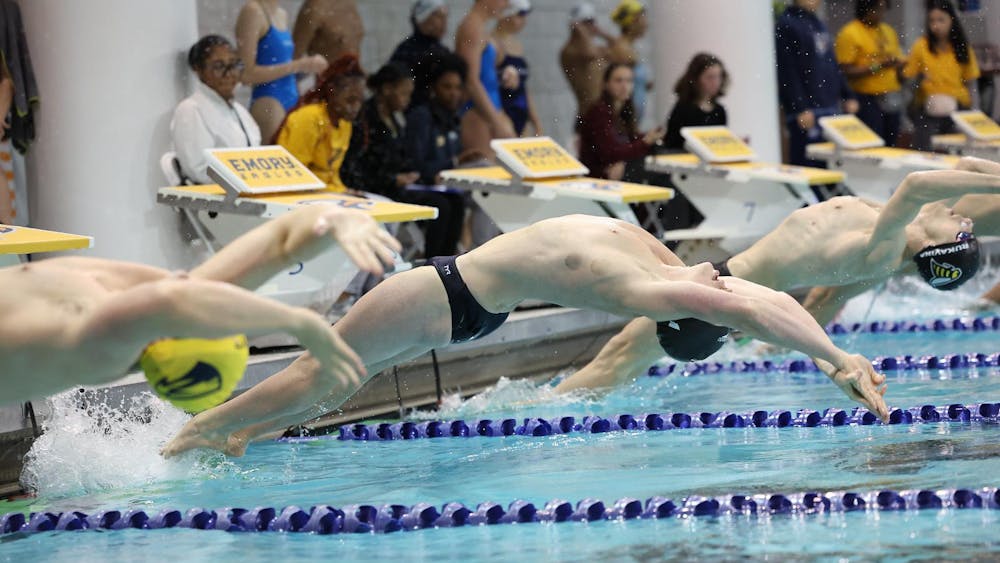
Photo courtesy of Flickr Creative Commons
News Editor Dustin Slade, code-named "The Server," emerged victorious in The Emory Wheel's laser tag tournament last weekend. The tournament was held at Laser Quest Gwinnett in Duluth, Georgia. The editorial board of the Wheel and a group of eight-year olds at a birthday party competed in the tournament.
"I was hunting the most dangerous game," Slade said. "Man."
The tournament was scheduled to begin at 7:00 p.m., but the start time was pushed back to 7:30 p.m. because Social Media Editor Jenna Kingsley's car was running late. The other editors and writers had to wait to begin the tournament until Kingsley's car arrived because Managing Editor Lizzie Howell, who had made the reservation, was riding in Kingsley's car.
"I refuse to apologize for being late," Kingsley, code-named "Starbuck," said. "I transcend time. To paraphrase Shakespeare, 'better three hours too late than a minute too soon.'"
Sports Editor Zak Hudak, code-named "Kurly Q," was listed as questionable before the tournament, due the significant amount of homework he had over the weekend and his duties as the Social Chair of Kappa Alpha Order. However, he demonstrated his tremendous love for the game by bracketing his distractions and arriving at the tournament on time and ready to play. Unlike, for instance, Kingsley.
"Those who showed up late disrespected the honor of the great sport of laser tag," Hudak said. "I came to play. I came to defeat Dustin Slade."
Hudak and Slade are bitter rivals, at both laser tag and life. One day Slade told Hudak that his hair did not look good. In reply, Hudak said that no one reads News.
"I just don't understand why he would say such a thing," Slade said. "We are the most read section of the Wheel. That was a cruel and hateful lie."
Hudak was equally upset.
"My hair always looks good," he said.
A key aspect of laser tag is alliances. Weak players need to find strong players who are willing to protect them, and strong players need weak players who can distract their opponents. Hudak, an incredibly strong (not to mention handsome) player, quickly formed an anti-Slade alliance with Howell, code-named "Sportsqueen," by far the weakest competitor in the tournament.
"I am a strong, independent laser tag player," Howell said. "But I really needed Zak [Hudak] to protect me."
After forming their alliance, Hudak and Howell went off in search of Slade. However, after shooting him directly multiple times, Hudak became convinced that Slade was cheating.
"Dustin [Slade] covered his sensors with his body," Hudak said. "It was obvious to everyone and insulting to the sport."
Unable to defeat Slade, Hudak and Howell went off in search of easier prey. They soon found Student Life Editor Loli Lucaciu, code-named "Bumblebee." However, Lucaciu proved surprisingly deadly, tagging Hudak and Howell with a smile on her face.
"There were good vibes shooting out of everyone's laser guns," Lucaciu said. "It was such a great bonding experience for the Wheel!"
Off in search of an opponent they could defeat, Hudak and Howell found an extremely tiny eight-year old, code-named "Hungergame," who was playing laser tag to celebrate his best friend's birthday party. However, Hungergame proved too fast for them, shooting them and then running away before they could catch him.
"I have incredible respect for Hungergame as an opponent," Hudak said. "He really epitomizes everything that is great about laser tag. This is what he was born to do."
When the game came to a close, all the competitors gathered around the scoreboard to see the final results. Slade emerged as the winner, while Hudak came in fifth place and Howell finished last, not tagging a single opponent and scoring negative points.
"I hope my victory will prove to Zak [Hudak] that people actually read News," Slade said.
The editors of The Emory Wheel will hold another group bonding event at the end of this semester.
– By Bennett Ostdiek, Editor-at-Large





